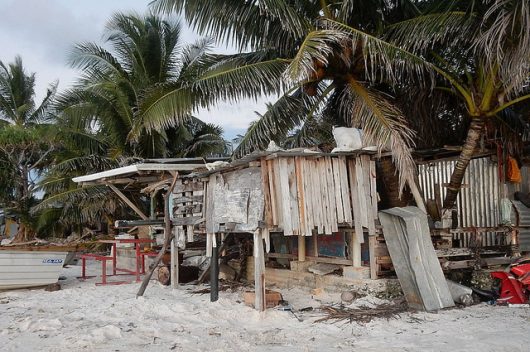Climate Change and the Tuvalu Poverty Rate

Being one of the smallest countries in the world, the country remains in isolation and depends significantly on imports such as food and fuel. With poor natural resource endowments other than fisheries, the Tuvalu poverty rate can be attributed to the minuscule opportunities for monetary gain and the dependence on the outside world.
The most recent record of the poverty rate in Tuvalu was in 2010, placing 26.3 percent of the country’s population below the poverty line. While poverty has declined in the country since the mid-1990s, the lack of local employment opportunities has manifested in high levels of unemployment, which increases the burden of low earnings.
In addition to low employment rates, climate change has also had a significant effect on the people living on Tuvalu’s islands. A recent study found that a significant proportion of individuals living on the islands suffered monetary losses due to natural disasters. Cyclone Pam, the natural disaster that swept over the island in 2015, proved this, as 45 percent of the nation’s population was displaced due to the storm’s effects.
With the highest point of the Tuvalu islands only reaching 4.6 meters above sea level, the country is vulnerable to and significantly impacted by the increased magnitude and frequency of natural disasters. With the poor investing their earnings in their homes, durable goods and furnishings, they are that much more threatened by storm surges and the floods associated with them.
Therefore, while the poverty rate has been decreasing in recent years across the Tuvalu islands, climate change negatively threatens the future livelihoods of the native population and further deepens the levels of poverty.
With the increasing threat from the waves surrounding the islands, more needs to be done to reduce the chance of future impacts. Aso Ioapa, a citizen from Tuvalu, noted that “We have to face that we might have to go to another place. That is hard. But migration is the last option. We want to save our countries.”
Tuvalu citizens will continue to do just that; save the country they love. The ADB country operations business plan emphasizes this. The 2017-2019 plan aims to improve fiscal management, communication services, and island port facilities while also building disaster resilience for Tuvalu.
If the country continues to improve its employment opportunities and address the climate change issues, the Tuvalu poverty rate will continue to reduce over time.
– Tess Hinteregger
Photo: Flickr